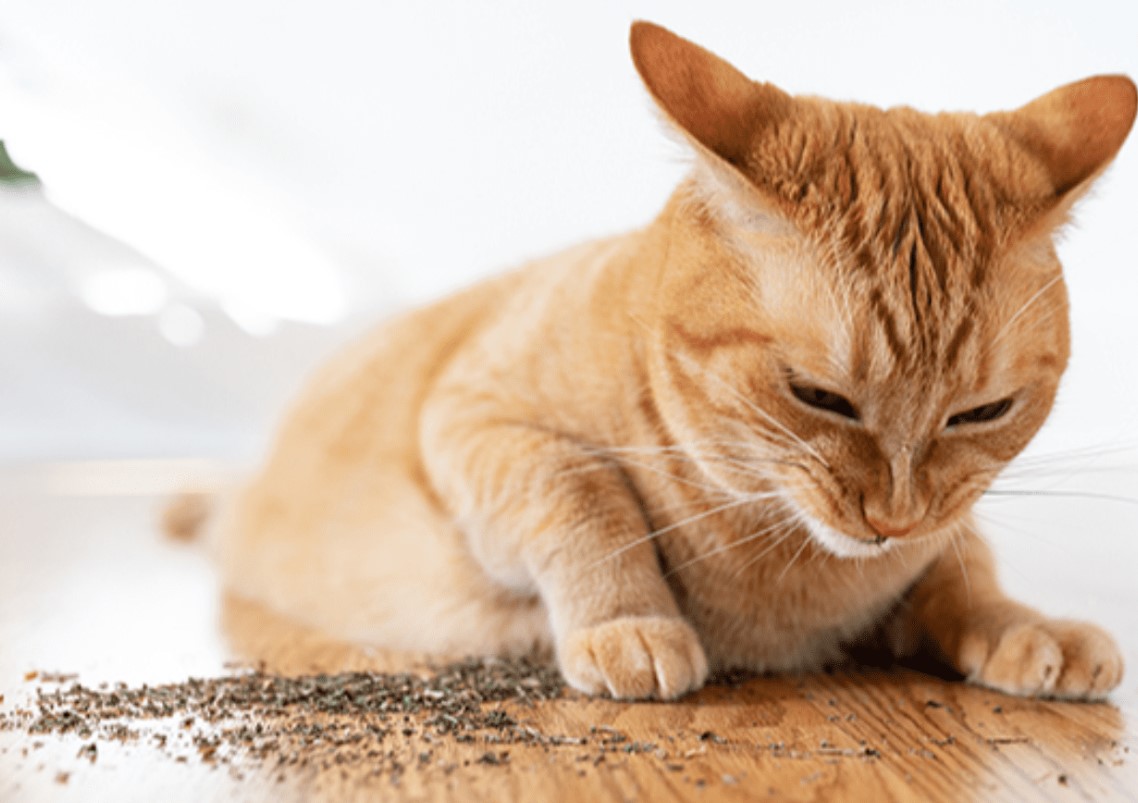What is Catnip? Can Cats Eat Catnip?
Can cats eat catnip? Discover whether cats can safely eat catnip, the benefits, potential risks, and how to introduce this feline favorite to your pet. Learn all about catnip and its effects on cats. Follow Cat Memorial Stones !!
What is Catnip? The Effects of Catnip on Cats

Catnip (Nepeta cataria) is a member of the mint family and contains a chemical compound called nepetalactone. This is the magic ingredient that triggers a euphoric response in about 50-75% of cats.
When cats smell catnip, the nepetalactone binds to receptors in their noses, stimulating sensory neurons that connect to the brain. This triggers a variety of reactions, including:
- Euphoria and Relaxation: Cats may appear blissful, purring contentedly, and rolling around.
- Playfulness and Hyperactivity: Some cats become energized, exhibiting playful behaviors like chasing imaginary prey, batting at toys, and running around with abandon.
- Aggression: In rare cases, catnip can cause aggression in some cats.
- Drooling and Vocalization: Some cats may drool or become more vocal.
These effects typically last for about 5-15 minutes, after which the cat becomes temporarily immune to catnip’s effects for an hour or two.
Can cats eat catnip?
Yes, cats can safely eat catnip. Ingesting catnip is non-toxic to cats and is generally considered safe. While sniffing catnip often results in stimulation, eating it tends to have a calming effect due to the different way the herb interacts with the feline system when consumed.
Benefits of Catnip for Cats
- Behavioral Enrichment: Catnip can encourage physical activity in sedentary cats, promoting exercise and mental stimulation.
- Stress Relief: For anxious or stressed cats, ingesting catnip can induce a calming effect, helping them relax.
- Training Aid: Sprinkling catnip on scratching posts or new beds can attract cats to desired locations, aiding in training.
- Digestive Aid: Catnip has mild digestive benefits and can help alleviate minor stomach discomfort.
Side effects of catnip on cats

While catnip is safe for most cats, it’s essential to use it responsibly.
Overconsumption
- Vomiting or Diarrhea: Eating excessive amounts of catnip may lead to mild gastrointestinal upset.
- Loss of Interest: Frequent exposure can result in diminished responses over time.
Individual Sensitivity
- Not All Cats React: Approximately 20-30% of cats lack the genetic sensitivity to nepetalactone and may not react to catnip.
- Kittens and Senior Cats: Very young kittens (under six months) and some older cats may show little to no response.
What happens when cats eat catnip?
While catnip is generally safe, excessive consumption can lead to gastrointestinal upset. Signs of overconsumption include:
- Vomiting
- Diarrhea
- Lethargy
If your cat shows any signs of distress after consuming catnip, it’s best to consult a veterinarian.
Are cats supposed to eat catnip or just smell it?
- Smelling Catnip: When cats inhale nepetalactone, it stimulates the central nervous system, often leading to energetic behaviors like rolling, jumping, or playful aggression.
- Eating Catnip: Ingestion tends to have a sedative effect, making cats relax, drool, or even fall asleep.
Does catnip make cats sleepy or hyper? Catnip typically makes cats hyper. It triggers a euphoric response in most cats, leading to increased energy, playfulness, and sometimes even rolling around. However, the effects can vary from cat to cat. Some cats may experience a calming or sedative effect.
>>> Click Can cats eat dates? Are Dates Safe for Cats?
Cat allergic to catnip symptoms

While it’s uncommon, some cats can indeed develop allergies to catnip. It’s often surprising because catnip is generally considered safe and even beneficial for cats.
Symptoms of a catnip allergy can include:
- Skin irritation: This might manifest as itching, scratching, or even hair loss.
- Sneezing and runny nose: These are signs of respiratory irritation.
- Eye discharge: Watery or crusty eyes can be another symptom.
- Gastrointestinal issues: In some cases, cats may experience vomiting or diarrhea.
If you suspect your cat might be allergic to catnip, it’s important to consult with your veterinarian. They can provide a proper diagnosis and recommend appropriate treatment options, which might include avoiding catnip altogether or using antihistamines or other medications.
How long does catnip last on cats?
The effects of catnip on cats typically last for about 10-15 minutes. After this initial burst of excitement, they may lose interest and become desensitized. However, it usually takes around 30 minutes to an hour before they can respond to catnip again.
How much catnip can a cat have?
While catnip is generally safe for cats, it’s best to give it in moderation. Excessive consumption can sometimes lead to mild gastrointestinal upset like vomiting or diarrhea.
Here are some guidelines:
- Start small: Begin with a small amount and observe your cat’s reaction.
- Offer it infrequently: Too much catnip can cause tolerance, so avoid giving it too often.
- Consider toys: Catnip-filled toys are a good way to offer it without excessive ingestion.
If your cat experiences any adverse effects after consuming catnip, consult your veterinarian.
Alternative Herbs for Cats
If your cat doesn’t react to catnip or you’re looking for variety, consider these feline-friendly herbs:
- Silver Vine (Actinidia polygama): Often elicits a stronger response than catnip.
- Valerian Root (Valeriana officinalis): Can have stimulating effects similar to catnip.
- Tatarian Honeysuckle (Lonicera tatarica): Safe wood from this plant can attract cats.
How to Offer Catnip to Your Cat
When introducing catnip to your cat’s diet, consider these options:
- Dried Catnip: This is the most common form and can be sprinkled on toys or bedding.
- Catnip Treats: Many pet stores sell catnip-infused treats, which can be a fun way to reward your cat.
- Catnip Tea: You can brew catnip tea using dried leaves. Once cooled, it can be offered in small amounts as a refreshing drink.
- Catnip Oil: Some pet owners use catnip oil, but it’s essential to use it sparingly and ensure it’s specifically made for pets.
Conclusion
In summary, cats can safely eat catnip, and it can provide various benefits, from aiding digestion to promoting playfulness and relaxation. Always introduce catnip gradually and monitor your cat’s reactions to ensure they enjoy it safely. If you have any concerns about your cat’s health or dietary needs, consult with your veterinarian.
By understanding how catnip affects your feline friend, you can enhance their well-being and provide them with a joyful, stimulating experience. Whether through dried leaves, treats, or homemade catnip tea, adding catnip to your cat’s life can be a fun and rewarding endeavor.
FAQs
- Side effects of catnip on cats eyes
Catnip generally doesn’t cause any harmful side effects to a cat’s eyes. While some cats may experience temporary hyperactivity or changes in behavior after exposure to catnip, these effects typically do not involve eye problems.
- Can cats eat dried catnip?
Yes, cats can eat dried catnip. It’s perfectly safe for them and is often used as a treat or toy. Many cats enjoy the euphoric effects it has on them, such as rolling, playing, or rubbing against it.
- Can too much catnip kill a cat?
No, catnip is not toxic to cats. In fact, it’s generally considered safe for them. While excessive amounts can sometimes cause mild gastrointestinal upset, such as vomiting or diarrhea, it’s not fatal.
- Side effects of catnip on kittens
Catnip is generally safe for kittens. While most adult cats respond to catnip, kittens might not react as strongly or at all until they’re a bit older.
>>> Read: Can cats eat cashews?
